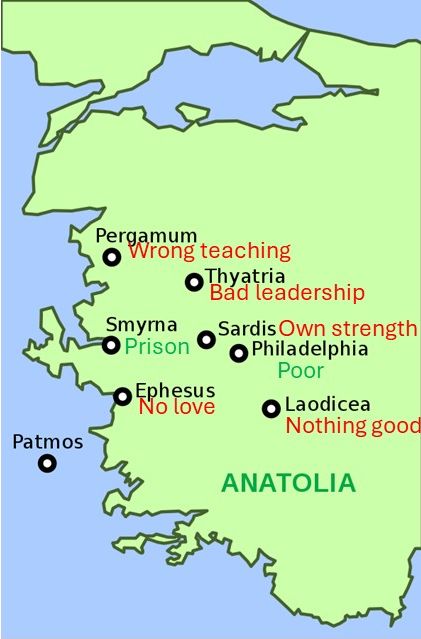The letters to the churches (Ch. 2-3)
Chapter 2 and 3
The letters describe how the churches live in the vision. This shows the view that Jesus has on the churches. And the result is devastating:
- only two church onyl receive praise: Smyrna and Philadelpia which suffer under persecution and poverty
- two churches are completely failing, while of them dont get any praise at all: Ephesus and Laodicea
- another church gets only praise due to a few members of the church: Sardis
- another one he wants to set as an example of judgment for the others: Thyatira
- the one church missing is hit hard by wrong teaching leading them to idolatry: Pergamon
This is even illustrated in a symmetric pattern:
- Ephesus - total failure: no love
- Smyrna - great example: but in persecution
- Pergamon - big problem: wrong teaching allowed
- Thyatira - sets as warning example: leadership is the problem
- Sardis - big problem: missing Holy Spirit
- Pergamon - big problem: wrong teaching allowed
- Philadelpha - great example: but in poverty
- Smyrna - great example: but in persecution
- Laodicea - total faiture: nothing good so say
Jesus faces each of the churches individual to their challenge and gives a promise based on their challenge. He is always starting with praise before he challenges the church.
Ephesus is the biggest of the cities and their work, teaching, endurance and much more is impressive but they fail in having lost their first love. This is so dramatic that Jesus will remove their lambstand, so they have no purpose if they don’t changes. Jesus reminds them on the vision and promises them a situation like in the Garden Eden when the relationship (and love) with God was so strong.
The next is Smyrna. This is a church under presecution. Jesus gives them the promise that they will overcome their challenges: conflict with the Jew, prison and even death. Jesus is their example as he was risen from the death. The 10 days remind us on Daniel that ate only vegetables for 10 days to be pure.
Pergamon is confused town. The leadership in the church allowed wrong teaching which lead the people into a lifestyle that compromises with the Roman culture. The failure in leadership is reflected in the story with Balaam who lead Israel into idolatry and Moses failed to intervene. As the leadership fails, Jesus intervenes and separates them. The ones who stay faithful get a new identity.
Thyatira is the probably the smallest of the churches but gets the longest letter and is used as an example of judgment. Jesus comes as a judge, but promises the ones that overcome the authority that he has. The problem is simply the leadership. As Jesebel as queen led Israel astray, so is the leadership here. The answer is not to leave the church but to stay faithful.
The letter to Sardis may sound a bit confusing. Jesus shows up as the one that remind them on their vision and on the power of the Holy Spirit. The only reason for praise are the few that remained faithful, otherwise there is many critique. They lack the Holy Spirit. He was the one that gave live to the dead bones. And he is the one that works in us as “every good and perfect things comes from above”. Here we are not talking about how the church is effective but how people think they can life out of their own strength and even playing with their salvation.
Philadelphia is another city that has a challenging position. Here it is not merely persecution and prison but financial and social trouble. The key of David is the key to the storage rooms and provides for the people. God promises them steadfastness and he comes as the trustworthy one.
Finally the church in Laodicea does not receive any praise. Jesus comes as the ruler and promises them to rule with him if the overcome - what a promise. Lukewarm does not refer to indecisiveness but to having a purpose: Cold water is useful to drink, hot water to cure, but lukewarm water is good for nothing. Knocking on the door is not an invitation to give the life to Jesus but the desperate call of the lover to the beloved.
